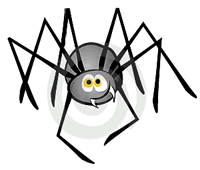
William Caxton introduced printing into England, and also translated a number of literary works from French, Latin and Dutch. Within his translations he used words he picked up while learning and practising his trade in Germany and Belgium, including spincop, from the Dutch spinnekop (spider), and okselle, from the Dutch oksel (armpit).
The English word spider comes via the Middle English spither and the Old English spiþra from the Proto-Germanic *spenthro, which comes from *spenwanan (to spin). Another Old English for spider was gangewifre (a weaver as he goes). In other Germanic languages the words for spider retain the link to spin: Spinne (German), spinnekop / spin (Dutch), spindel (Swedish) and שפּין (shpin) – Yiddish.
When I came across the word spincop it set me wondering whether it might be related to a Welsh word for spider, copyn (also cop, pryf cop(yn), corryn). Does anyone know the etymology of these words?
The Proto-Indo-European root word for spider is *araKsn, and the words for spider in the Romance languages come from this root: aranea (Latin), aranya (Catalan), aranha (Portuguese), araña (Spanish), ragno (Italian).
While okselle didn’t really catch on in Standard English, a related word, oxter, is used in dialects of Northern England, and in Hiberno English and Scots. This word is thought to come from the Old English ōxta, which is probably related to the Old English word axle or axis – eax. The medical term for this part of the body is axilla, which comes from Latin and is diminutive of ala (wing).
you know, that made me wonder too…
The word for spider in Arabic is ^Ankabút عنكبوت
and the Hebrew is ^Akbísh I think עכביש
Yet I really can’t figure out the root of the Arabic form and how did it come to this.
Cob and lob are both archaic English terms for spider, and I’d bet the first is related to copyn. The Online Etymology Dictionary entry for “cobweb” points to attercop, which I’ve never encountered before.
As for lob I have absolutely no idea where it came from. I only know about it due to an annotated edition of The Hobbit, explaining a rhyme that begins, “Crazy cob and lazy lob…”
This also explains why the giant spider that shows up in The Lord of the Rings is named Shelob.
Reminds me of Norwegian edderkopp ‘spider’, composed of edder ‘poison’ and kopp which according to Bokmålsordboka means ‘something swollen’ in this context: http://www.dokpro.uio.no/perl/ordboksoek/ordbok.cgi?OPP=edderkopp&begge=S%F8k+i+begge+ordb%F8kene&ordbok=begge&s=n&alfabet=n&renset=j
This also reminded me of “attercop” from Bilbo’s taunting rhyme in The Hobbit. Here’s a very interesting look into the etymology with parallels and cognates in other languages:
http://lingwe.blogspot.com/2009/10/attercops-of-mirkwood.html
There’s a rather different connection with Welsh in this blog post.
Spider in French is l’araignée. Most of the Romance language words for “spider” are feminine except for Italian (il ragno)…
“Axilla” is also in other languages: l’aisselle (French), l’ascella (Italian), la axila (Spanish), a axila (Portuguese), l’aixella (Catalan), all feminine. There are also slang/informal terms for “armpit” in Spanish (sobaco) and Portuguese (sovaco), which may be a distant relative of sub-brachium (under arm).
I’m not sure if sobaco/sovaco is a Latin American trend though. According to the wikipedia entry and the some websites of the carnaval bloco “Suvaco do Cristo”, Tom Jobim once answered the question “Onde voce mora?” (“Where do you live?”) with “No suvaco do Cristo” (“In the armpit of Christ”) in reference to the area directly under the right arm of the famous Cristo Redentor on top of morro do Corcovado in Rio.
Well, clearly I should have remembered seeing attercop before, then. D’oh.
The kop element in Dutch spinnekop (known to me only as a regional variety of the standard spin) may be influenced by folk etymology, kop meaning ‘(an animal’s) head’. I wouldn’t know the underlying word that led to that reinterpretation, though.
Ah, here’s an article (in Dutch) on regional Dutch designations for ‘spider’, including spin, kop and variations therof: http://users.ugent.be/~jvkeymeu/cyberlemmata/nederlands/lemmata/spin/etym.html Maybe I’ll find some time to translate the whole article for you, but here’s what it says on kop:
“According to Blancquaert 1933, 371f, the word kop(pe) (with variety kob(be)) was at a certain time used in the entire language area along with spin, the global meaning being ‘sphere-shaped’, hence ‘a spider’s egg-sacks (or sack-web?)’, subsequently ‘web’. The most common types of spiders make egg-sacks which they attach to or near their webs.”
And of course, the formal: arachnid/arachnida (class) along with aranaea (order?) Latin and Romance. Good to see Proto-Indo-European get a mention. I’ve just started delving into it myself.